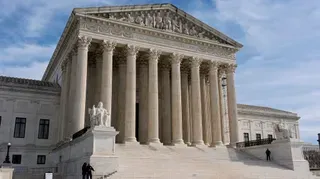October 9, 2009
Study: Those With Older Brothers More Likely to be Gay
Kilian Melloy READ TIME: 4 MIN.
There are various theories as to why gay men are sexually and romantically attracted to those of their own gender. One hypothesis is that a cluster of specialized neurons in the brain acts as a switch that determined which gender an individual will find attractive; if so, such hard-wiring may be the result, at least in part, of a person's genetics.
Another theory is that hormone levels affect the development of a fetus in such a way that he or she may be gay from the womb. Though no definitive evidence exists to prove any theory of homosexuality, a new study does seem to indicate that a correlation exists between how likely a person is to be gay and how many children that person's mother had prior to his birth.
The study, published Oct. 8 in Canada, honed the results of earlier studies. An Oct. 8 CanWest News Service article at Canada.com reported that there had been over a dozen earlier studies that demonstrated a link between older male siblings and gay people; the new study more clearly showed that the so-called "fraternal birth order effect" truly is a case of gay people being gay from the womb, and not being "turned" gay by their environment, their upbringing, or other factors.
The study involved one thousand male Canadians, the article reported, and appeared in the journal Proceedings of the National Academy of Sciences. The study showed that even if gay men were reared separately from their siblings, the number of older brothers they had still seemingly had an effect on how likely they were to be gay.
That result supports the theory that homosexuality has a biological basis, rather than a sociological or psychological basis. In other words, the study suggests that being gay is neither a mental illness nor a choice.
But while the results of the many studies that have been done display a remarkable consistency, the article reported, one expert issued a caveat: the older-brother theory only seems to account for one in seven gay men.
The phenomenon was first reported on in a paper by Ray Blanchard, who published his results in 2001, the article said.
But Blanchard, while acknowledging the importance of the new study, pointed out that six out of seven gay men cannot be accounted for by the theory.
Blanchard also pointed out that while the effect seems to be real, the numbers are quite small: the article cited him as saying that a first son has a two percent chance of being gay, while the odds for a fifth son rise only four points, to six percent.
The importance of keeping the numbers in mind is to correct fears that younger male children will probably be gay. "It can't be used as a guideline for parents making reproductive decisions," the article quoted Blanchard as saying.
Even so, the results underscore what gay men have been saying all along: while some may believe that they choose to be attracted to other men, gays say that they not made a decision in the matter: it's simply part of who they are.
The commentary on the article that was also published on Oct. 8 expressed the point of view, offered by scientists from Michigan State University, that a biological basis for homosexuality, even if it does not explain all gays, is a powerful argument against discrimination and stigmatization.
Drawing on one projection that the older brother effect can account for up to one million gay men in the United States alone, the group wrote, "If their mothers had carried only sisters before, the demographics say, those males would be straight.
"It stretches the meaning of the word to suggest that these boys and men 'choose' to be gay."
Added the scientists in their commentary, "Who gets to choose how many brothers their mother had before them?"
The uncertainties of the science surrounding the issue of homosexuality has led to some interesting, if not unlikely-sounding, metrics by which to ponder the question. A March 30, 2000 article in Slate noted that one paper, written by Marc Breedlove and published in the science journal Nature, had also speculated that prenatal hormone levels made homosexuals gay from birth--before then theorizing that those same hormone levels could result in tell-tale hands in which a person's index finger was notably shorter than his ring finger.
Breedlove, a professor of psychology at UC Berkely, made a more nuanced than might at first be clear.
As quoted in a UC Berkely press release from March 29, 2000, professor Breedlove said, "There is no gene that forces a person to be straight or gay.
"I believe there are many social and psychological, as well as biological, factors that make up sexual preference," Breedlove continued.
"Having said that, these data do suggest that there are some people in the world who are gay because of fetal androgen levels."
Kilian Melloy serves as EDGE Media Network's Associate Arts Editor and Staff Contributor. His professional memberships include the National Lesbian & Gay Journalists Association, the Boston Online Film Critics Association, The Gay and Lesbian Entertainment Critics Association, and the Boston Theater Critics Association's Elliot Norton Awards Committee.




